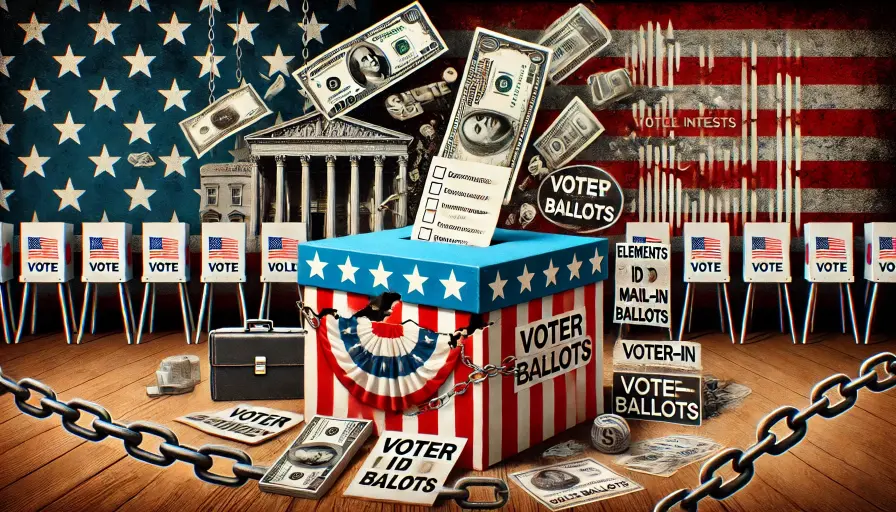As the U.S. heads into another election cycle, concerns over election interference and vote buying loom large. Vice President and Democratic nominee Kamala Harris was leading the polls for several weeks though it now seems she and Republican presidential candidate Donald Trump are in a tight race.
Both Democrats and Republicans face accusations of manipulating the system, exploiting its vulnerabilities for political gain. Though direct, systemic corruption remains difficult to prove, the conversation around these issues reflects deeper anxieties about the fairness of the American electoral process.
Election interference takes on various forms, from misinformation and disinformation campaigns to policies that critics argue suppress voter turnout. Republicans often come under fire for actions that appear to disproportionately affect minorities and low-income voters, groups that tend to vote Democratic. Measures like strict voter ID laws, limiting early voting, or purging voter rolls are framed as ways to prevent fraud, even though evidence of widespread fraud is rare. For Democrats and civil rights groups, these tactics represent a calculated effort to suppress key voting blocs under the guise of election security.
Democrats, however, face their own set of accusations. Republicans frequently criticize their opposition to voter ID laws and their support for extensive mail-in voting, claiming that these practices open the door to fraud. The 2020 election, conducted largely by mail due to the pandemic, was a flashpoint for these arguments. Despite extensive investigations that found no significant irregularities, the debate over mail-in voting and election security continues, with both sides entrenched in their positions.
Foreign interference, another form of election manipulation, poses a threat to both parties. Russia’s attempts to interfere in the 2016 election, largely through disinformation campaigns designed to sow discord, remain a potent reminder of external vulnerabilities. Though there was no clear evidence that Russian efforts favored one party over the other, the incident exposed the fragility of U.S. election security in the face of cyber threats. As the 2024 election approaches, the specter of foreign interference lingers, with both Republicans and Democrats facing a shared challenge of how to safeguard the democratic process.
Beyond interference, the issue of vote buying takes on a subtler, more pervasive form in modern U.S. politics. Rather than outright bribery, vote buying often appears in the guise of influence buying. Republicans are often accused of catering to wealthy donors and corporate interests, shaping policies that benefit the top 1% in exchange for financial support. Tax cuts for the rich, deregulation, and judicial appointments favoring corporate power are seen by critics as forms of indirect vote buying, benefiting those who fund political campaigns.
Democrats face similar accusations, though with a different set of interest groups. Labor unions, environmental organizations, and other left-leaning special interests provide significant financial backing for Democratic campaigns. Republicans argue that Democrats, in turn, “buy” votes through policies like student debt relief or expanding welfare programs. While Democrats argue these policies are essential for reducing inequality and supporting struggling Americans, their opponents see them as calculated political moves designed to shore up support among key voting demographics.
At the heart of this issue is the role of money in politics, particularly the influence of Super PACs and dark money groups that can spend unlimited sums on campaigns. Both Democrats and Republicans benefit from the current campaign finance system, but critics argue that it leads to a form of electoral manipulation where wealthy donors and special interest groups hold disproportionate sway over politicians—and by extension, over the votes they cast.
Ultimately, accusations of election interference and vote buying are symptomatic of broader concerns about the integrity of the U.S. electoral system. While overtly corrupt actions are difficult to prove, both parties are seen as exploiting systemic weaknesses for their own gain. The real challenge lies in addressing these vulnerabilities, ensuring that elections are secure, fair, and transparent. Without meaningful reforms, the public’s trust in the democratic process will continue to erode, leaving voters skeptical of both parties and the system as a whole.
